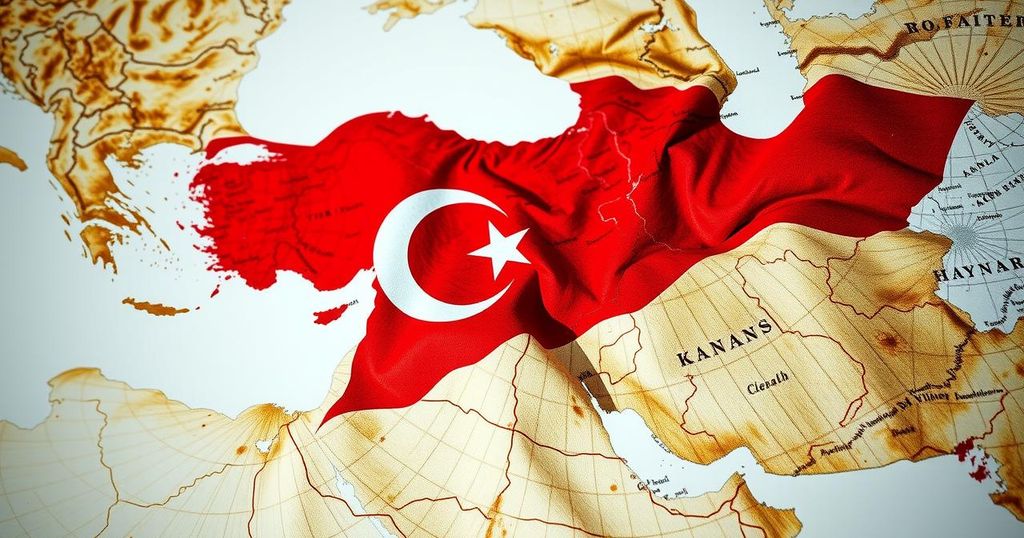Global news
AFGHANISTAN, AFRICA, ASIA, ASSAD, ENERGY SECURITY, ERDOĞAN, ERDOGAN, FOREIGN POLICY, HASSAN HASSAN, HEZBOLLAH, INTERNATIONAL RELATIONS, KURDISTAN WORKERS ’, KURDISTAN WORKERS ’ PARTY, LEBANON, LIBYA, MIDDLE EAST, NORTH AMERICA, PKK, SYRIA, SYRIAN CONFLICT, TAYYIP ERDOĞAN, UNITED STATES
Marcus Li
0 Comments
The Shift in Middle Eastern Dynamics: Turkey’s Rise as a Geopolitical Power
The Middle East’s geopolitical landscape is transforming with the decline of Iranian influence and the rise of Turkey, particularly following the fall of the Assad regime in Syria. Turkey’s support for Syrian rebels has elevated its role as a regional powerhouse, posing challenges to Iranian domination in neighboring Iraq and beyond. As Turkey asserts its influence across various regions, this shift is reconfiguring political dynamics within the Middle Eastern context.
The geopolitical landscape of the Middle East is undergoing a significant transformation as evidenced by the recent developments in Syria and the diminishing influence of Iran. With the fall of the Assad regime, often perceived as a pivotal victory for Turkey, Ankara is poised to assert its dominance across the region. Under President Recep Tayyip Erdoğan’s leadership, Turkey’s support for Syrian rebels solidified its role as a key regional power, fostering stability for those insurgent groups, enabling them to rearm and reorganize effectively amidst a backdrop of limited external support for the Assad regime.
As Iran grapples with the consequences of a stretched military strategy and Israel’s ongoing strikes against its allies, Turkey’s ascent as a Sunni-led power presents a direct challenge to longstanding Iranian influence, particularly in Iraq where Iranian-backed Shia militias have historically dominated. Turkey’s consistent support for opposition forces in northwestern Syria, coupled with its historical presence in Iraq, allows it to reshape relations and strengthen its geopolitical position, essentially ending Iran’s once-feared “Shia crescent”.
Erdoğan’s ambitions, however, extend beyond the immediate challenges to Iranian power in Iraq and Syria. They encompass an expansive engagement with various regions, illustrated by Turkey’s mediation in African territorial disputes and military involvement in Libya. Additionally, Turkey’s ties with the Taliban in Afghanistan and its military support during the Nagorno-Karabakh conflict reinforce its status as a pivotal player in multiple theaters.
This shift toward a more assertive foreign policy carries significant implications for regional rivals, particularly Saudi Arabia. Unlike Iran’s reliance on sectarianism and proxy groups, Turkey is establishing its influence through direct relationships with local Sunni factions, presenting a fresh challenge to Saudi traditional leadership over Sunni Islam. This could ultimately redefine alliances and rivalries within the region, as Turkey’s rise complicates the existing power dynamics that have historically centered on Iranian influence.
In summary, the changing allegiance structures within the Middle East, marked by the decline of Iranian power and the ascent of Turkey, indicate a reconfiguration of influence that will likely have profound implications for the region’s future. In the post-Assad era, the focus will shift from Iran’s ambitions to Turkey’s intentions, creating a scenario where Turkey’s role as a central player in Middle Eastern politics becomes increasingly undeniable.
The Middle East has long been characterized by shifting alliances and power dynamics, particularly between Sunni and Shia factions. Since the beginning of the Syrian conflict in 2011, various nations have engaged in complex military and diplomatic maneuvers to influence the outcomes of the region’s conflicts. Iran has historically maintained a substantial foothold in the Middle East through its support of Shia militias and proxy groups. However, recent developments, especially the decline of the Assad regime, are altering the regional balance, giving Turkey an opportunity to emerge as a counterbalance to Iranian influence. As President Erdoğan’s administration navigates these changes, the implications of Turkey’s ascent beckon a reevaluation of the existing geopolitical order.
In conclusion, the evolving balance of power in the Middle East signifies a notable transition from Iranian dominance to a burgeoning Turkish influence. As Turkey manifests this influence through military aid and diplomatic initiatives, the region’s political landscape is shifting dramatically. The implications of these changes are profound, not only for Iran but for broader regional dynamics involving Sunni political entities, which may reshape alliances and create new forms of conflict. The focus of regional powers is likely to transition from countering Iran’s influence to navigating Turkey’s expanding footprint, redefining the future of Middle Eastern geopolitics.
Original Source: www.theguardian.com




Post Comment